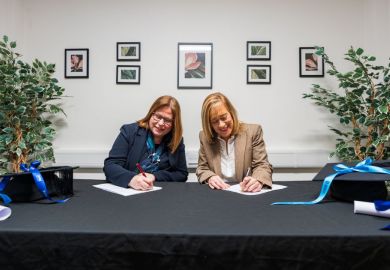New regulations aimed at cracking down on unethical practices by charities could “make it more difficult for universities to develop strong relationships with alumni”, the executive director of the Council for Advancement and Support of Education (CASE) Europe has warned.
John Middleton said that these relationships are “exactly the sort of donor approach and care” that the Etherington review of fundraising regulation “held up as desirable”.
In the wake of the review, charities, including universities, that spend more than £100,000 a year on fundraising will have to pay a levy to finance a new fundraising regulator.
Last month, Wendy Piatt, the head of the Russell Group, said that the alliance was “pushing to be exempted” from the rules and argued that it was unfair that universities had been “dragged into regulation that covers charities”.
Mr Middleton’s comments were made as the annual Ross-CASE report of higher education giving in the UK was published on 26 April. The survey of 113 UK institutions found that philanthropic income secured in new funds rose by 8 per cent to £860.9 million from 2013-14 to 2014-15, while total cash income received grew by 14 per cent to £756.7 million.
However, the total number of donors increased by just 1.6 per cent to 232,520 during that period, including a 1.1 per cent rise in the number of alumni donors, suggesting that universities are receiving higher-value gifts and pledges from a relatively flat number of donors year-on-year. Almost four-fifths of donors (79 per cent) were alumni.
“University fundraising is based on the development of long-term multilayered relationships – particularly with alumni – as well as targeted approaches to trusts and foundations,” said Mr Middleton.
“That the rate of increase in new funds and pledges secured is outstripping that of donor numbers indicates the value of these relationships and shared goals.”
He added: “Care must be taken to ensure that new regulations do not make it more difficult for universities to develop strong relationships with alumni and others, as this is exactly the sort of donor approach and care that the review held up as desirable.”
While only 2 per cent of donors were organisations, they accounted for almost two-thirds (64 per cent) of the income secured in new funds.
The universities of Oxford and Cambridge brought in more than two-fifths (44 per cent) of the total philanthropic income over the year and almost one-third (32 per cent) of total donors, while institutions classified as being “established” fundraisers accounted for 34 per cent of new funds and 36 per cent of donors, the report added.
The survey also revealed a rise in the number of universities breaking the £1 million barrier in terms of donations. When comparing figures for three years across 103 universities, 59 institutions secured more than £1 million in total new funds in 2014-15, a 20 per cent increase from 2012-13.
The report illustrated a rise in universities’ investment in philanthropy, with total fundraising expenditure increasing by 10.5 per cent and alumni relations costs climbing by 7 per cent. The majority of these investments were spent on staff.
POSTSCRIPT:
Print headline: Fundraising regulator ‘could hamper university-alumni relations’
Register to continue
Why register?
- Registration is free and only takes a moment
- Once registered, you can read 3 articles a month
- Sign up for our newsletter
Subscribe
Or subscribe for unlimited access to:
- Unlimited access to news, views, insights & reviews
- Digital editions
- Digital access to THE’s university and college rankings analysis
Already registered or a current subscriber?







